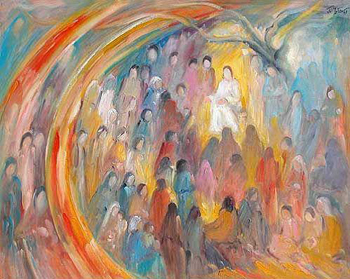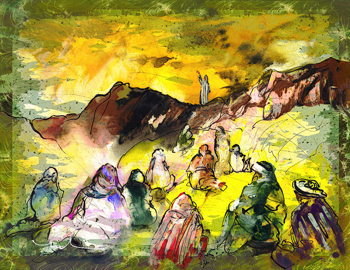For Sunday February 16, 2020
Lectionary Readings (Revised Common Lectionary, Year A)
Deuteronomy 30:15-20 or Sirach 15:15-20
Psalm 119:1-8
1 Corinthians 3:1-9
Matthew 5:21-37
I’ve spent a few years now, trying to shed transactional Christianity. By which I mean, a version of Christianity in which I try to earn God’s love (or at least stave off God’s anger), by being A Very, Very, Very Good Girl. A version in which God and I negotiate like traders on Wall Street: piety for protection. Good deeds for comfort. Long prayers for a long life.
I know in my head that transactional Christianity isn’t true. I understand intellectually that God is not a rule-obsessed tyrant, waiting to zap me if I make a mistake. But most of us have a God-related misconception or two lurking in our hearts, and even if we try to get rid of them, they cling.
So I come to this week’s Gospel reading with trepidation, because Jesus’s words seem — at first glance — to support a very transactional version of God: “If you are angry with a brother or sister, you will be liable to judgment.” “If your right eye causes you to sin, cut it off and throw it away; it is better for you to lose one of your members than for your whole body to be thrown into hell.” If you don’t reconcile quickly with your accusers, “you will be thrown into prison until you’ve paid the last penny.” “Whoever marries a divorced woman commits adultery.”
Yikes. What are we supposed to do with such dire warnings? Where is the unconditional love we’d much rather hear about? This portion of Jesus’s Sermon on the Mount sounds like it’s chock full of threats, issued by a severe and perfectionistic God. Is there a loophole somewhere? Anywhere?
I wonder if the problem is in part a cultural one. As a 21st century Christian living in America, I am inclined to read Jesus’s sermon — or rather, I am inclined to read all of Scripture — through an individualistic lens. Whenever I see “you” in the text, I think: “Me. Me, Debie Thomas. This is a warning to and for me.”
But that is not an accurate reading. Jesus isn’t admonishing individuals in his Sermon on the Mount; he is calling forth a new community. A blessed community. A beloved community. A community meant to initiate a radical way of doing life on the earth. A community Jesus trusts will follow in his footsteps, and incarnate divine love to a world hungry for hope and healing.
 |
If we read Jesus’s words about murder, anger, reconciliation, adultery, lust, divorce, and oath-making in this more communal context — if we read them as instructions given in the hope of building and sustaining a community that is both blessed and commissioned to bless — what version of God might emerge?
I think the version that emerges is of a God who cares profoundly about human dignity. A God who takes our relationships with each other very seriously, and wants us to treat each other — not with a bare minimum of civility and morality — but with the deepest respect, integrity, and love.
Take, for instance, Jesus’s teaching on murder. You have heard that murder is wrong, he tells his listeners. “But I say to you” that coexisting without literally killing each other is not enough to sustain a beloved community. It’s just the beginning. Agreeing not to commit homicide is essential and lovely, but what about all the other ways we human beings “kill”our relationships through resentment, rage, unforgiveness, and spite? Don’t we often treat others as if they are dead to us? Less than human? Unworthy of love? Don’t we inflict soul-killing violence on each other through our words? Our silences? Our refusal to extend and receive forgiveness? What good is it if we, God’s children, technically spare each other’s lives, and yet commit unspeakable acts of murder through a refusal to love?
Or consider Jesus’s teaching on adultery. You have heard that you shall not commit adultery, he says. But I say to you that refraining from sleeping with each other’s spouses is just the barest foundation of Christ-centered community. What about honoring human dignity by refusing in any way to cheapen or objectify other people for our own pleasure? What about helping each other to succeed in our marriages and other relational commitments, instead of making those vows even harder to fulfill? What about taking seriously our responsibility to encourage each other in holy living? Not “holy” as in stiff, boring, lifeless, and prudish, but holy as in whole, abundant, faithful, and life-giving?
Or consider Jesus’s instruction not to swear by anything on earth or in heaven, but to simply let our yes be yes, and our no, no. Imagine, Jesus is suggesting, a community in which the default assumption is that people tell each other the truth. People keep their promises. People don’t deceive one another. In such a community, no one needs to say, “I swear!” in order to earn trust. In God’s beloved community, no one uses language to connive or manipulate others. We remember that the words we say are spoken in the presence of God, and so we speak with care and respect for each other.
 |
Finally, consider Jesus’s words about divorce, which I know strike us contemporary Christians as particularly jarring. Remember that in Jesus’s day, women whose husbands divorced them were often left to starve in the streets. They had no financial recourse, they would not be welcomed back into their childhood homes, and the social stigma attached to divorce was severe. What if Jesus is saying, “It’s not enough to follow the letter of the law, hand your wife a certificate of divorce, and send her packing — as if you have no further obligation to a fellow human being. What about her vulnerability? Her shame? Her future? In other words, in the beloved community Jesus is shaping, we have a responsibility to uphold each other’s dignity as brothers and sisters in Christ — even when our relationships as spouses or partners come to an end. That deeper responsibility cannot be signed away with a piece of paper. It endures no matter what.
The longer I sit with this passage of Scripture, the more I see in it — oddly enough — the care and attentiveness of God. God wants us to treat each other well. God cares a lot about our dignity. God doesn’t want us to settle for bare minimums in the communities we create; God wants us to relate in ways that reflect the fullness of divine love, mercy, grace, and generosity.
I believe we do ourselves a disservice if we read Jesus’s words as condemnation. Jesus isn’t condemning us; he’s reminding us of truths we intuitively know. The way of love is hard. It’s costly. It hurts. But let’s not fool ourselves; there is a place called hell. It’s the place we create for each other every time we choose an easy and austere legalism over an arduous and radical love.
SO PAY ATTENTION TO WHAT’S IMPORTANT, Jesus says in every way he can think to articulate it. You matter. How you live with each other matters. What you say and do, what you focus on, what you prioritize as my disciples — these things matter! Your choices have life-and-death consequences, so please take your communal lives seriously. Please don’t make faith harder for yourselves and for others by settling for bare minimums. Reconcile with each other. Honor each other. Speak truthfully to each other. Protect each other. Do these things — not to earn God’s blessings, but because you are already so richly blessed.
Okay, I’ll admit it: my transactional version of God is sometimes easier to live with than this one. How much more convenient and comfortable my life would be if I could compartmentalize it! If I could keep my religion private and hidden in its little corner, and forget that there is a seamless continuity between how I treat others, and how I relate to God. Christianity is not a rulebook for my private morality; it is a deeply incarnational, relational way of life that affects every single human encounter I engage in.
 |
But again: the will of God is not to shame and overwhelm us. God is not invested in our self-loathing. As Richard Rohr puts it: “It is quite helpful to see sin, like addiction, as a destructive disease instead of something for which we’re culpable or punishable and that ‘makes God unhappy.’ If sin indeed makes God ‘unhappy,’ it is because God loves us, desires nothing more than our happiness, and wills the healing of the disease.”
What would it be like if the children of God helped each other to succeed in all the ways Jesus’s sermon describes? Imagine what that community would look like! “But I say to you,” Jesus says, again and again and again. I say to you that so much more is possible than you have yet comprehended. Reach for it. Walk into it. Sustain it. You are loved and you are blessed, right here, right now. There is nothing left for you to earn, but there is everything left for you to share. Be the beloved community you long for.
Debie Thomas: debie.thomas1@gmail.com
Image credits: (1) Pilgrim-info.com: Catholic Shrines; (2) Fine Art America; and (3) Pixels.com.



